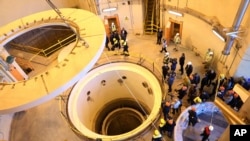Iran appears to be at odds with the United Nations nuclear watchdog about information it should be providing regarding its atomic program, the head of the International Atomic Energy Agency said Friday.
"We don't seem to be seeing eye-to-eye with Iran over their obligations to the IAEA," Rafael Grossi told a conference in Rome, adding that he was concerned over a recent announcement by Tehran that it was boosting its enrichment capacity. "We need to put our relationship back on track."
Grossi said he was "still hopeful" Tehran would explain the unexpected discovery a few years back of traces of uranium traces at three undeclared sites.
A recent IAEA report said Iran had agreed to a visit by the U.N. watchdog in November to start giving long-waited answers.
However, the meeting has not yet happened.
The issue of the unexplained uranium particles has become an obstacle in wider talks to revive Iran's 2015 nuclear deal with world powers since Tehran is now seeking a closure of the IAEA's investigation as part of those negotiations, Western powers say.
Grossi said the talks appeared to have stalled. "At the moment, it does not seem to have the momentum it needs to [get] back to life," he said.
He noted that he was concerned by Iran's announcement last month that it had begun enriching uranium to 60% purity at its Fordow nuclear plant.
"Iran informed us they were tripling, not doubling, tripling their capacity to enrich uranium at 60%, which is very close to military level, which is 90%" he said.
"This is not banal. This is something that has consequences," he said.“It gives them an inventory of nuclear material for which it cannot be excluded ... that there might be another use. We need to go. We need to verify."
Iran denies seeking nuclear weapons, saying its nuclear technology is solely for civil purposes.





